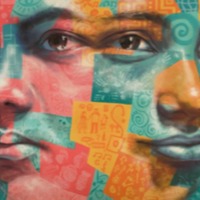
I was born in central Africa and had a happy childhood. My family had a farming business and we lived comfortably in the suburbs of a town. I went to school every day and loved my education.
As I was growing up there was a lot of political and ethnic tension in my area. My life was shattered when I was 11. My family was killed by rebels one day when I was at a friend's house. Neighbours in the local community took me in for a while and looked after me but soon an older man claiming to be a friend of my family came to visit. He said it wasn't safe for me to stay there and that he'd look after me. He took me out of my country by road to a neighbouring country.
He left me with a woman in a house with lots of other women where I was made to have sex with older men. Sometimes it was 3 or 4 men a day. I was scared and didn't know where I was. When I was 12 years old I was pregnant and taken for an abortion. It left me with abdominal problems I still live with today. After the abortion I was sent back to the brothel. When I had healed I was made to have sex with the men again.
I'd lived in the brothel for 2 years when a man called Abasi* took me away. We travelled on a plane to London. I didn't know then but my passport was false, giving me a different name and date of birth. The immigration official believed I was a 21 year old woman. I was just 14 years old, in a foreign country where I couldn't speak the language.
Abasi took me to a city where I was locked in a room in a brothel. There men would come for parties and would rape us. There were many other girls living there from all over the world. We were locked in our rooms during the day and made to bag up quantities of drugs. In the evenings, men came for the drugs and to have sex with us. I tried to run away once and was caught and brought back. The guard beat me really badly in front of the other girls and I was told if I did it again, he would kill me. I believed him.
I was sexually assaulted and physically abused there for a year before I managed to escape. I didn't want to die, but knew that nothing could be worse than the life I was living. During one of the parties I saw an open door and ran for it. I ran for 2 hours in the middle of the night. I could only speak a little English and didn't know where I should run to. I was 15 and alone in a foreign country.
I managed to come to London and was told I should try and claim asylum. The immigration officials took my fingerprints and matched them to the passport I had been given to enter the country. They believed I was 22 years old rather than 15. I was placed in temporary immigration accommodation and then arrested by the police for document forgery. I could not believe what had happened and felt the abuse had begun all over again.
The police charged me and sent me to an adult women's prison. There, staff recognised I was a child and arranged for me to have a solicitor and I was released to a hostel for adult women who have been victims of sexual exploitation. My solicitor also introduced me to the NSPCC's Child Trafficking Advice Centre (CTAC), who have been an amazing support.
With their and my solicitor's support I have successfully challenged local Children's Services view that I'm adult and lying about my age and abuse. They have helped me to find a safe place to live. My CTAC social worker has been there to support me dealing with my ongoing legal issues and threats of deportation. They have given me the emotional support I needed to feel empowered to go back to school and continue to recover from the horrific abuse and exploitation I was made to suffer. In return, I've worked with the CTAC team to support other young people who have been through a similar experience to me.
I'm continuing to live with the effects of what happened to me. I've been diagnosed with post-traumatic stress disorder and memory loss. I'm outraged that I still have to defend myself from the accusation that I've invented my abuse and trafficking. I'm just glad CTAC have been there to defend me through this experience.
All credit is given to NSPCC Child Trafficking Advice Centre -nspcc.org.uk/ctac
Narrative can be found at https://www.nspcc.org.uk/what-we-do/childrens-stories-about-abuse/gracies-story/









